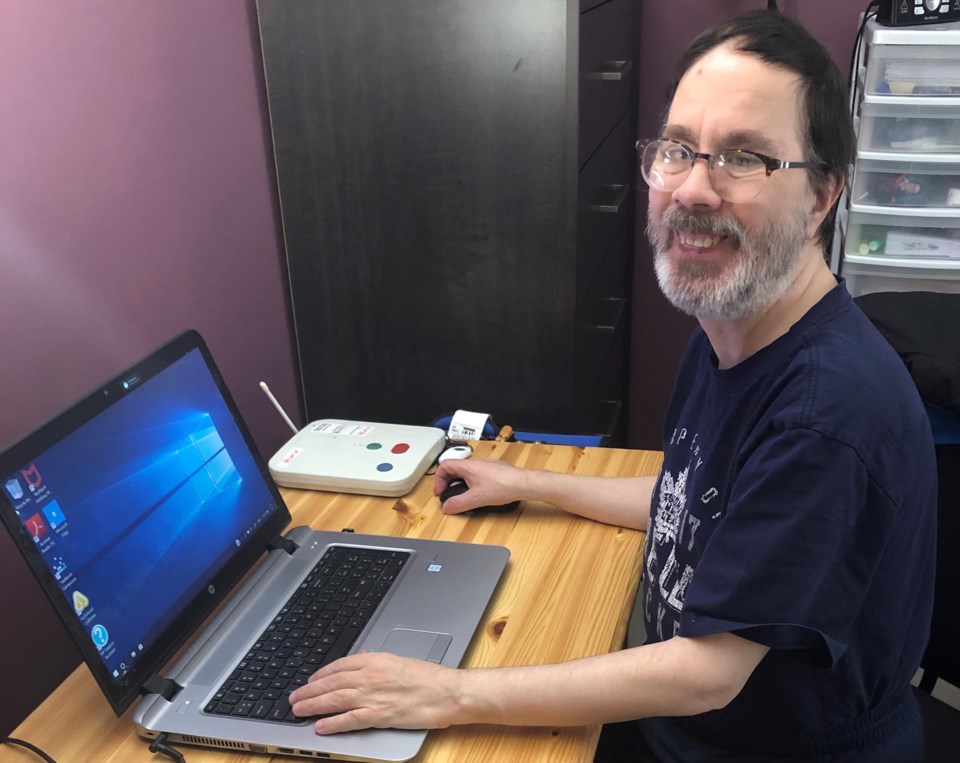NEWS RELEASE
DEAFBLIND ONTARIO
*************************
During a time when we are physically separated from family, friends, and our peers, technology helps to bridge the gap and encourage social connection from afar.
Although checking social media platforms, browsing the internet, and navigating video and audio streaming services are considered normal interactions, they also open doors of accessibility for others.
For Steven, a man with deafblindness, Facebook and email connect him with the outside world. “I communicate online because I like to talk to people… it is faster and easier [for me] to communicate.”
Deafblindness, a combined loss of hearing and vision, impacts access to information, communication, and mobility. Born with Rubella, also known as the German measles, Steven is profoundly deaf and blind in his left eye. He is legally blind in his right.
Professional intervenors connect people with deafblindness, like Steven, to other people and their community as a communication partner. Amy, one of the intervenors who supports Steven, has worked in the field for 17 years; 12 of those with DeafBlind Ontario Services.
Amy and Steven take a Total Communication Approach, which uses as many methods of communication as needed to facilitate the exchange of information. Steven uses Signing Exact English (SEE), a system of manual communication that strives to be an exact representation of English vocabulary and grammar. He also utilizes Braille and large print, along with large print notes for those with little experience with sign. In recent years, Steven has benefited from technological advancements, especially with respect to communication.
He uses an iPad and laptop on a daily basis to email, share on Facebook, converse through Facebook Messenger, and video chat with his family, friends, and intervenors. Steven also browses the internet to search areas of interest, coordinate plans, and set his weekly budget.
According to Amy, “Steven likes a variety of ways to communicate with friends and family that do not live close to him. Without the internet and social media, Steven would not be able to socialize as often with everyone in his life and stay connected.”
Now, more than ever, these mediums are integral to Steven. “I cannot go grocery shopping, or out to buy the essentials for my apartment... I am ordering everything online. My sister can’t come visit [because of social distancing]. Since I cannot use the phone to talk to people, my iPad and laptop are important for me to be able to stay in touch.”
Steven also uses his laptop and iPad to stay informed about COVID-19.
While Steven’s world is augmented by these mediums, accessibility-related barriers can also prevent people with disabilities from engaging online.
A barrier is anything that keeps a person with a disability from participating in the social or economic life of our communities. With respect to technology, this can mean websites, apps, PDFs, and videos that are inaccessible to assistive technologies.
During challenging times such as these, we must ensure that people with disabilities like deafblindness are protected. This means accessible media communication that is available when information is given, official information about COVID-19 in accessible formats, along with digital media that is accessible or made accessible upon request.
Thursday, May 21, 2020, marks the ninth annual Global Accessibility Awareness Day (GAAD). This day aims to raise awareness about digital (web, mobile, software, etc.) access and inclusion for those with disabilities.
“Digital innovations continue to reshape society on many levels; their potential to advance and impact daily living, like for Steven, are undeniable. However, over 15 per cent of Ontario’s population has a disability, whether visible or not, including more than 40% of people over age 65. This number will only continue to grow as the population ages. We must look at making technology accessible and useable by persons with disabilities,” said Chief Executive Officer, Roxanna Spruyt-Rocks.
DeafBlind Ontario Services, which is based in Newmarket, provides accessible residential and customized support services across the province. Their holistic approach to Intervenor Services empowers people with deafblindness to achieve their goals and dreams. To learn more, visit deafblindontario.com and celebrate GAAD on May 21 using the hashtag #gaad.
*************************



